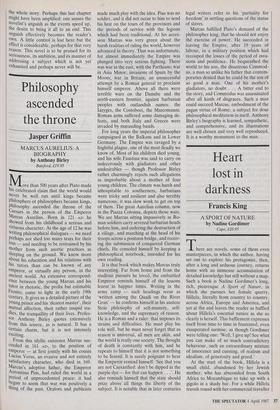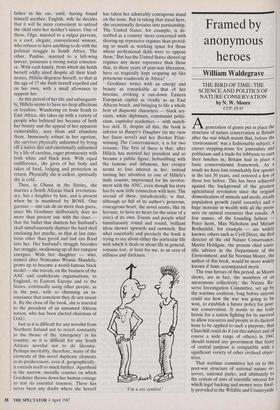Heart lost in darkness
Francis King
A SPORT OF NATURE by Nadine Gordimer
Cape, £10.95
There are novels, some of them even masterpieces, in which the author, having set out to explore his protagonist, then, after a long and arduous journey, returns home with an immense accumulation of detailed knowledge but still without a map. Such a book is Nadine Gordimer's long, rich, picaresque A Sport of Nature, in which she pursues her female quarry, Hillela, literally from country to country, across Africa, Europe and America, and yet at the end leaves the reader as baffled about Hillela's essential nature as she so clearly is herself. This bafflement expresses itself from time to time in frustrated, even exasperated surmise, as though Gordimer were telling one: 'Well, I give up! See what you can make of so -much contradictory behaviour, such an extraordinary mixture of innocence and cunning, of realism and idealism, of generosity and greed.'
At the start of the book, Hillela is a small child, abandoned by her Jewish mother, who has absconded from South Africa to Mozambique to take up with a gigolo in a shady bar. For a while Hillela travels round with her commercial traveller father in his car, until, having found himself another, English, wife he decides that it will be more convenient to unload the child onto her mother's sisters. One of these, Olga, married to a vulgar parvenu, is a cool, elegant, conventional woman, who refuses to have anything to do with the political struggle in South Africa. The other, Pauline, married to a left-wing lawyer, possesses a strong social conscien- ce. With each family, from which she holds herself oddly aloof despite all their kind- nesses, Hillela disgraces herself, so that at the age of 17 she finds herself expelled and on her own, with a small allowance to support her.
At this period of her life and subsequent- ly, Hillela seems to have no deep affections or loyalties. Wandering on from South to East Africa, she takes up with a variety of people who befriend her because of both her beauty and the appeal of her apparent vulnerability, uses them and abandons them. Immensely robust in her egotism, she survives physically unharmed by living off a native diet and emotionally unharmed by a life of careless, eager promiscuity with both white and black men. With equal indifference, she gives of her body and takes of food, lodging and protection in return. Physically she is ardent, spiritually she is cold.
Then, in Ghana in the Sixties, she marries a South African black revolution- ary, has a daughter by him, and is present when he is murdered by BOSS. One guesses — one can do no more than guess, since Ms Gordimer deliberately does no more than present one with the clues that the bullet that shatters her husband's skull simultaneously shatters the hard shell enclosing her psyche, so that at last emo- tions other than greed and lust can flood into her. Her husband's struggle becomes her struggle, swallowing up all her rampant energies. With her daughter — who, named after Nomzamo Winnie Mandela, grows up to become a world-famous black model — she travels, on the business of the ANC and confederate organisations, to England, to Eastern Europe and to the States, continually using other people, as in the past, with so charming an in- souciance that somehow they do not resent it. By the close of the book, she is married to the president of an unnamed African nation, who has been elected chairman of OAU.
Just as it is difficult for any novelist from Northern Ireland not to revert constantly to the theme of the 'emergency' in his 'country, so it is difficult for any South African novelist not to do likewise. Perhaps inevitably, therefore, many of the elements of this novel duplicate elements in its predecessors, even if, geographically, it extends itself so much further. Apartheid is the narrow, metallic counter on which Gordimer throws down her human coinage to test its essential trueness. There has never been any doubt where she herself has taken her admirably courageous stand on the issue. But in taking that stand here, she occasionally deviates into partisanship. The United States, for example, is de- scribed as a country 'more concerned with shoring-up repressive regimes than provid- ing so much as working space for those whose professional skills were to oppose them.' But has the United States shored up regimes any more repressive than those that, in these years of post-war liberation, have so tragically kept cropping up like poisonous toadstools in Africa?
Gordimer writes with an energy and beauty as remarkable as that of her heroine, evoking a run-down Eastern European capital as vividly as an East African beach, and bringing to life a whole host of disparate characters — black ser- vants, white diplomats, communist politi- cians, capitalist academics — with match- less skill. If, despite all this, the book is inferior to Burger's Daughter (in my view her finest novel) and her Booker Prize- winning The Conservationist, it is for two reasons. The first of these is that, after Hillela has married her president and so became a public figure, hobnobbing with the famous and infamous, her creator seems to lose interest in her, instead turning her attention to one of Hillela's male cousins, imprisoned for his involve- ment with the ANC, even though his story has by now little connection with hers. The second of these, paradoxically, is that, although so full of its author's generous, courageous heart, the novel seems, like its heroine, to have no heart (in the sense of a core) of its own. Events and people whirl tumultuously round and round, brilliant ideas shower upwards and outwards. But what essentially and precisely the book is trying to say about either the particular life with which it deals or about life in general, remains lost, at least for me, in an area of stillness and darkness.
1m a sex symbol.'



























































 Previous page
Previous page